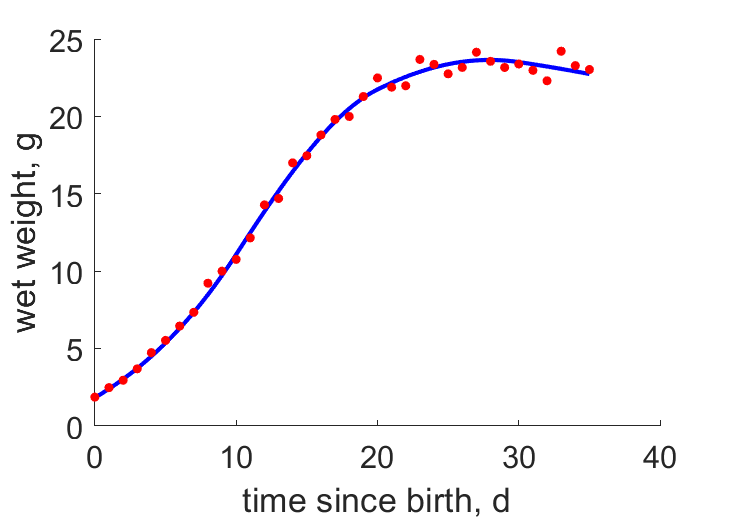Predictions & Data for this entry
| Model: std | climate: A | migrate: | phylum: |
| COMPLETE = 2.5 | ecozone: TN | food: biHs | class: |
| MRE = 0.025 | habitat: 0iTf, 0iTh, 0iTi | gender: Dg | order: |
| SMSE = 0.001 | embryo: Tnwf | reprod: O | family: |
Zero-variate data
| Data | Observed | Predicted | (RE) | Unit | Description | Reference |
|---|---|---|---|---|---|---|
| ab | 21 | 21.51 | (0.02413) | d | age at birth | WPT |
| tx | 35 | 34.95 | (0.001366) | d | time since birth at fledging | WPT |
| tp | 105 | 97.02 | (0.07604) | d | time since birth at puberty | guess |
| tR | 365 | 365 | ( 0) | d | time since birth at 1st brood | LP |
| am | 9125 | 9113 | (0.001318) | d | life span | WPT |
| Li | 12 | 11.99 | (0.0004861) | cm | ultimate total length | LP |
| Wwb | 1.9 | 1.819 | (0.04271) | g | wet weight at birth | PachBeis2010 |
| Wwi | 25 | 26.46 | (0.05837) | g | ultimate wet weight | PachBeis2010 |
| Ri | 0.03836 | 0.03721 | (0.0298) | #/d | maximum reprod rate | PachBeis2010, WaltBeis1992 |
Uni- and bivariate data
| Data | Figure | Independent variable | Dependent variable | (RE) | Reference |
|---|---|---|---|---|---|
| tW |  | time since birth | wet weight | (0.02175) | WaltBeis1992 |
Pseudo-data at Tref = 20°C
| Data | Generalised animal | Forpus passerinus | Unit | Description |
|---|---|---|---|---|
| v | 0.02 | 0.01907 | cm/d | energy conductance |
| p_M | 18 | 438.4 | J/d.cm^3 | vol-spec som maint |
| k_J | 0.002 | 0.01823 | 1/d | maturity maint rate coefficient |
| k | 0.3 | 0.3043 | - | maintenance ratio |
| kap | 0.8 | 0.6521 | - | allocation fraction to soma |
| kap_G | 0.8 | 0.8004 | - | growth efficiency |
| kap_R | 0.95 | 0.95 | - | reproduction efficiency |
Discussion
- Body temperatures are guessed
- mod_2: v is reduced
- mod_2: food availability is taken variable in tW data
- mod_3: Pseudo-data point k is used, rather than k_J; Data set tp and parameter t_R are added, the latter replacing clutch interval t_N. Postnatal T is based on PrinPres1991, see get_T_Aves. See further the revision page, theme puberty
Bibliography